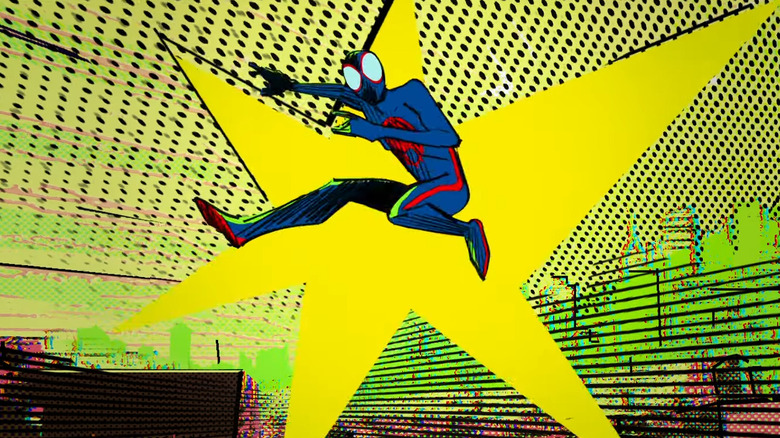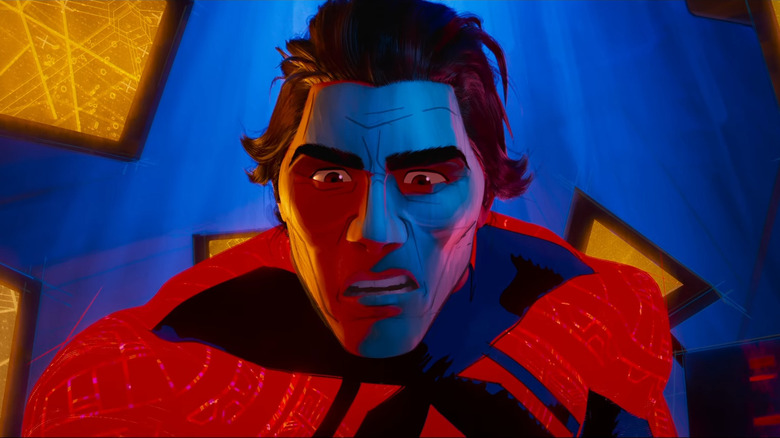Across The Spider-Verse Breaks Every Spider-Man Rule - And That's A Good Thing
This article contains spoilers for "Spider-Man: Across the Spider-Verse"
Spider-Man has been around for such a long time that a certain amount of expected tropes and story beats have formed around the character. Even the relatively irreverent MCU Spider-Man (Tom Holland) has to follow certain rules, and to its credit, "Spider-Man: Across the Spider-Verse" recognizes the situation and even makes it a key plot point.
Miguel O'Hara's (Oscar Isaac) Spider-Society has devoted itself to upholding the canonic Spider-Man life events across the multiverse in order to stop potentially disastrous scenarios. This is just as morally complex as you'd expect, and while the movie takes great pains to portray every Spider-hero as a decent person who's simply gone through a lot, there's no question that from Miles Morales' (Shameik Moore) point of view, the Spider-Society are definite antagonists ... despite only trying to follow the historically established rules that come with being a Spider-Person.
It's not a surprise that the movie presents the Spider-Society as flawed, especially once Miguel reveals that the fact that Miles was bitten by a spider from another universe makes him an anomaly that will never have a place on the table. After all, "Spider-Man: Into the Spider-Verse" spent a ton of time convincing the viewer that anyone can be a Spider-Man given the right circumstances. When we find out that the Society's creed is that anything could make a Spider-Man but after that, you're beholden to a certain sequence of life events, there's no way this doesn't end up challenging everything Miles is all about — which in turn challenges everything we've assumed about Spider-Man. Here's why it's a great thing.
Fighting the odds is what makes a Spider-Man, and Miles reaffirms this by breaking all the rules
Who's the true Spider-Man? The hero who fights insurmountable odds for a minuscule chance to save a life, or the one who's willing to follow the pre-established Spider-hero rules to end up where fate deems he should be?
The chase scene battle between Miles and the Spider-Society gives a decent hint about the real answer, as the relatively inexperienced but extremely motivated Miles proceeds to outfight, outsmart, and outlast the horde of his alternate-universe counterparts just to get a chance to save his dad (Brian Tyree Henry) from the vengeful Spot (Jason Schwartzman), without even stopping to acknowledge the fact that the villain is now far too powerful for him to take on alone. By refusing to allow Jefferson Davis' death to happen and completely ignoring personal safety on this quest, Miles demonstrates just about the purest Spider-Man spirit out there ... despite the fact that by the Spider-Society's canon, he's nothing but an aberration.
With the conflict between nature — demonstrated in Miles' ability to become the purest Spider-Man out there despite his starting point — and the nurture-oriented traditionalists of the Spider-Society, "Spider-Man: Across the Spider-Verse" is making a huge argument for uprooting all the traditional truths we've known about being a Spider-person. In other words, change just might be good.
With multiple teases about Miguel's own rather un-Spider-Man-like nature, it may very well be that the man who "Across the Spider-Verse" presents as the upholder of tradition will also embrace his rather unconventional origins by "Spider-Man: Beyond the Spider-Verse," and seal the movie trilogy's apparent mission to utterly demolish everything you've known about Spider-Man rules.

